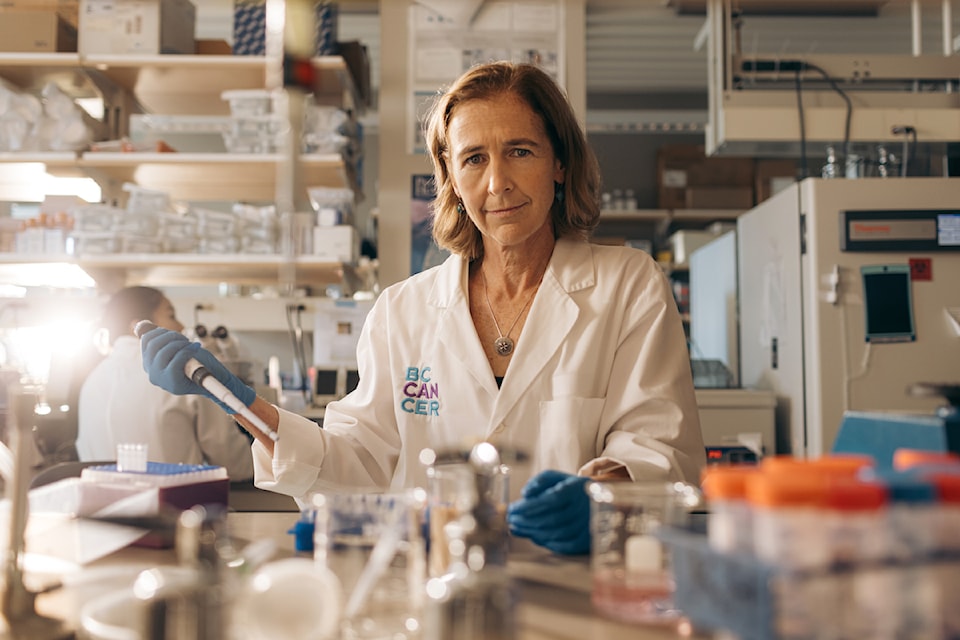Science
AI Revolutionizes Women’s Cancer Care on Vancouver Island

An innovative application of artificial intelligence developed in British Columbia is set to enhance cancer treatment for women, particularly for those diagnosed with endometrial cancer. Researchers at BC Cancer and the University of British Columbia (UBC), led by Dr. Jessica McAlpine and Dr. Ali Bashashati, are working on a new approach to improve diagnosis and treatment strategies for this type of cancer, which is the sixth most common among women.
Endometrial cancer presents unique challenges due to the ambiguous appearance of its cells, which can lead to inconsistent diagnoses. This complexity makes it difficult for healthcare providers to determine the need for treatment and to select the appropriate therapy. To address this issue, the research team developed a system that categorizes endometrial cancer into four distinct groups, each with different clinical outcomes. Despite this advancement, they discovered a subgroup with significant diversity, prompting the introduction of the AI-based ProMisE test.
Dr. McAlpine explained, “We were able to look at these images of tumours and identify things that the pathologist couldn’t see and that the molecular tools couldn’t identify.” The AI technology can accurately predict which patients who appear to have favorable outcomes may actually face worse prognoses. This capability allows doctors to provide more targeted treatment, potentially preventing cancer recurrence. Additionally, the use of AI can help certain patients avoid unnecessary treatments, including chemotherapy and radiation, which can be taxing on their health.
The implementation of these AI tools, which include sophisticated scanners and hardware, could begin in Victoria as early as next year, contingent on securing philanthropic funding and necessary approvals. “We plan to pilot it in a couple of centres, and Victoria is potentially one of those,” Dr. McAlpine stated, emphasizing the strength of the research team and oncologists in the region.
The potential pilot location carries personal significance for Dr. Brad Nelson, who recently assumed the Immunotherapy Research Chair at BC Cancer in Victoria. In previous discussions, he highlighted the lack of research focused on women’s cancers, a subject that resonates with him deeply. The Trev & Joyce Deeley Research Centre, named in memory of Joyce Deeley, who passed away from ovarian cancer, reflects the community’s commitment to advancing cancer research. Joyce’s husband, Trev Deeley, contributed a legacy donation of $5 million to enhance cancer research efforts in the region.
William Litchfield, Associate Vice President of the BC Cancer Foundation for Vancouver Island, acknowledged the importance of this research. “Gynecological cancers are some of the most difficult cancers to treat and historically are an understudied area of cancer research,” he noted. “The innovative research underway at BC Cancer is incredibly important and holds the potential to save lives on the Island and across B.C.”
This announcement coincides with Gynecological Cancer Awareness Month, which takes place in September. The AI application is proving particularly valuable in identifying high-risk endometrial cancers that may be overlooked by traditional diagnostic methods. Dr. McAlpine emphasized that this is just the beginning of what AI technology can achieve in cancer care. “There are so many other applications we’re also looking at,” she said, adding that AI tools allow for a more personalized approach to treatment, tailoring care to individual patient needs rather than adopting a one-size-fits-all strategy.
As the research progresses, the potential benefits of integrating AI into cancer treatment on Vancouver Island could pave the way for significant advancements in women’s health, enhancing the quality of care and improving outcomes for patients facing this challenging diagnosis.
-

 Education2 months ago
Education2 months agoBrandon University’s Failed $5 Million Project Sparks Oversight Review
-

 Lifestyle3 months ago
Lifestyle3 months agoWinnipeg Celebrates Culinary Creativity During Le Burger Week 2025
-

 Science3 months ago
Science3 months agoMicrosoft Confirms U.S. Law Overrules Canadian Data Sovereignty
-

 Health3 months ago
Health3 months agoMontreal’s Groupe Marcelle Leads Canadian Cosmetic Industry Growth
-

 Science3 months ago
Science3 months agoTech Innovator Amandipp Singh Transforms Hiring for Disabled
-

 Technology3 months ago
Technology3 months agoDragon Ball: Sparking! Zero Launching on Switch and Switch 2 This November
-

 Education3 months ago
Education3 months agoRed River College Launches New Programs to Address Industry Needs
-

 Technology3 months ago
Technology3 months agoGoogle Pixel 10 Pro Fold Specs Unveiled Ahead of Launch
-

 Technology1 month ago
Technology1 month agoDiscord Faces Serious Security Breach Affecting Millions
-

 Business2 months ago
Business2 months agoRocket Lab Reports Strong Q2 2025 Revenue Growth and Future Plans
-

 Science3 months ago
Science3 months agoChina’s Wukong Spacesuit Sets New Standard for AI in Space
-

 Education3 months ago
Education3 months agoAlberta Teachers’ Strike: Potential Impacts on Students and Families
-

 Technology3 months ago
Technology3 months agoWorld of Warcraft Players Buzz Over 19-Quest Bee Challenge
-

 Business3 months ago
Business3 months agoNew Estimates Reveal ChatGPT-5 Energy Use Could Soar
-

 Business3 months ago
Business3 months agoDawson City Residents Rally Around Buy Canadian Movement
-

 Education3 months ago
Education3 months agoNew SĆIȺNEW̱ SṮEȽIṮḴEȽ Elementary Opens in Langford for 2025/2026 Year
-

 Technology1 month ago
Technology1 month agoHuawei MatePad 12X Redefines Tablet Experience for Professionals
-

 Technology3 months ago
Technology3 months agoFuture Entertainment Launches DDoD with Gameplay Trailer Showcase
-

 Business3 months ago
Business3 months agoBNA Brewing to Open New Bowling Alley in Downtown Penticton
-

 Technology3 months ago
Technology3 months agoInnovative 140W GaN Travel Adapter Combines Power and Convenience
-

 Technology3 months ago
Technology3 months agoGlobal Launch of Ragnarok M: Classic Set for September 3, 2025
-

 Science3 months ago
Science3 months agoXi Labs Innovates with New AI Operating System Set for 2025 Launch
-

 Technology3 months ago
Technology3 months agoNew IDR01 Smart Ring Offers Advanced Sports Tracking for $169
-

 Technology3 months ago
Technology3 months agoDiscover the Relaxing Charm of Tiny Bookshop: A Cozy Gaming Escape










